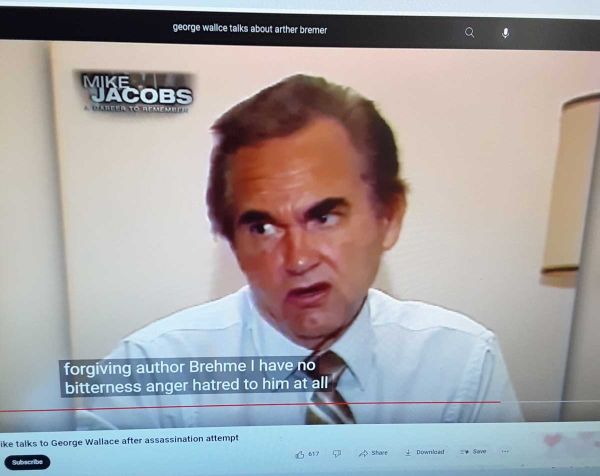Politicians on their Best Behavior
George C. Wallace grew up in rural Clio, Alabama, in 1919. He realized early that he wanted a career in politics and moved gradually up the political chain of command until 1962, when he became governor of Alabama. He ran as a Democrat, or as a "Dixiecrat." Other prominent Dixiecrats included Senator Strom Thurmond of South Carolina, Senator John Stennis of Mississippi, and Senator Herman Talmadge of Georgia. They practiced segregationist policies, a law-and-order administration, and a strong military. In 1968, Wallace decided to run for President and started with the Democratic primary. Unfortunately, a would-be assassin Arthur Bremer gunned him down. Bremer's gunshots ended Wallace's presidential bid and crippled him for life. He never fully recovered from the shooting.
Wallace died in 1998, aged 79, no doubt embittered by the assassination attempt. Bremer is actually still alive. He served 35 years of a 63-year prison sentence, and lives in obscurity today. I remember one of the TV-news networks interviewed Wallace after the shooting.
Before the interview, Wallace exhibited the impatience and irritability one would expect of someone who has had his Presidential dreams dashed by an assassin's bullet, knowing he will never walk again. Yet again, he has to sit in front of a television-news crew and act nonchalant about it. Once the interview started, Wallace's demeanor changed, and he suavely claimed to forgive Bremer for trying to kill him. He knew he couldn't let anyone see him lose it in front of the camera. He could not give his political enemies that pleasure. Like Rudyard Kipling wrote in his poem "If", Wallace had no choice but to swallow his grief, "start at your beginnings, and never breathe a word about your loss."
Wallace's performance in the interview represents the ethos of Americans in public life, that we wear a mask at all times in front of cameras. Americans always applaud simple politeness and emotional control, even if we know that politicians have a darker side and hide their misdeeds behind calm smiles and simple denials. This pleases the public and also comforts the political deal-makers, about whom no one ever hears. We prefer power to remain veiled in propriety and emotional control. The higher the position, the less a man can express himself off-the-cuff. Every public appearance has to follow programmatic expectations. The public doesn't like changes in the tone of voice, cynical smiles, or uncontrollable laughter. The public prefers the bland reassurance of amiability.
Likewise, the more spontaneity our leaders show, the less comfortable we are. We expect Presidents and most other leading politicians to control their speech and master their facial expressions. Public expectation really requires them to wear a mask. We are uncomfortable with people who show their real steel and toughness. We do not fully embrace our own human nature. We repress it, and are more comfortable when we do not see it in others.
Americans claim to love free-spirits and spontaneity. They claim to want to stay in touch with their human nature. We expect honesty and sincerity from our friends, our associates, and even our enemies. We can recognize when we reach a more intimate level of relationship with another person when we see them get angry, weep, or shout with joy. We are sort of choosy about how we emote with others. I remember especially some religious tracts that my old Christian friends had, that exhorted them toward honesty in relationships: "Quit wearing masks and be honest with your spouse!" After one or two knock-down, drag-out fights, maybe they will put the masks back on. Relationships function more diplomatically when we do that.
At the same time, we don't really want our leaders to embrace their human nature on that level, because we have learned to mistrust it as an animalistic trouble-maker. Like Woody Allen's "I am two with nature," we learn early-on that we should not let too many other people see our real selves. In fact, most people I know are "two with nature". We'll let them see our real selves after we have tested them and trust them enough.
This is basically Donald Trump's problem. The man is not a politician. He's learning the ropes sort of late. The curt rejoinders, the easy insults, the gratuitous sneering, snarling expression, these work against him before an audience of average Americans. He did not learn the lawyer's bed-side manner because he did not attend law school. Even George Wallace graduated from law school. Trump-voters basically mistrust politics-as-usual and like Trump's shoot-from-the-hip style. If anyone bothered to ask them what they like about him, they would probably answer, "What you see is what you get!" But many Americans, even those who planned to vote for him, hated the way he hammered Joe Biden with questions in the 2020 Presidential Debate. Trump went after Biden harder than any prosecutor would, and it cost him votes, no question! Not even newsmen interviewing Biden would have taken that course.


